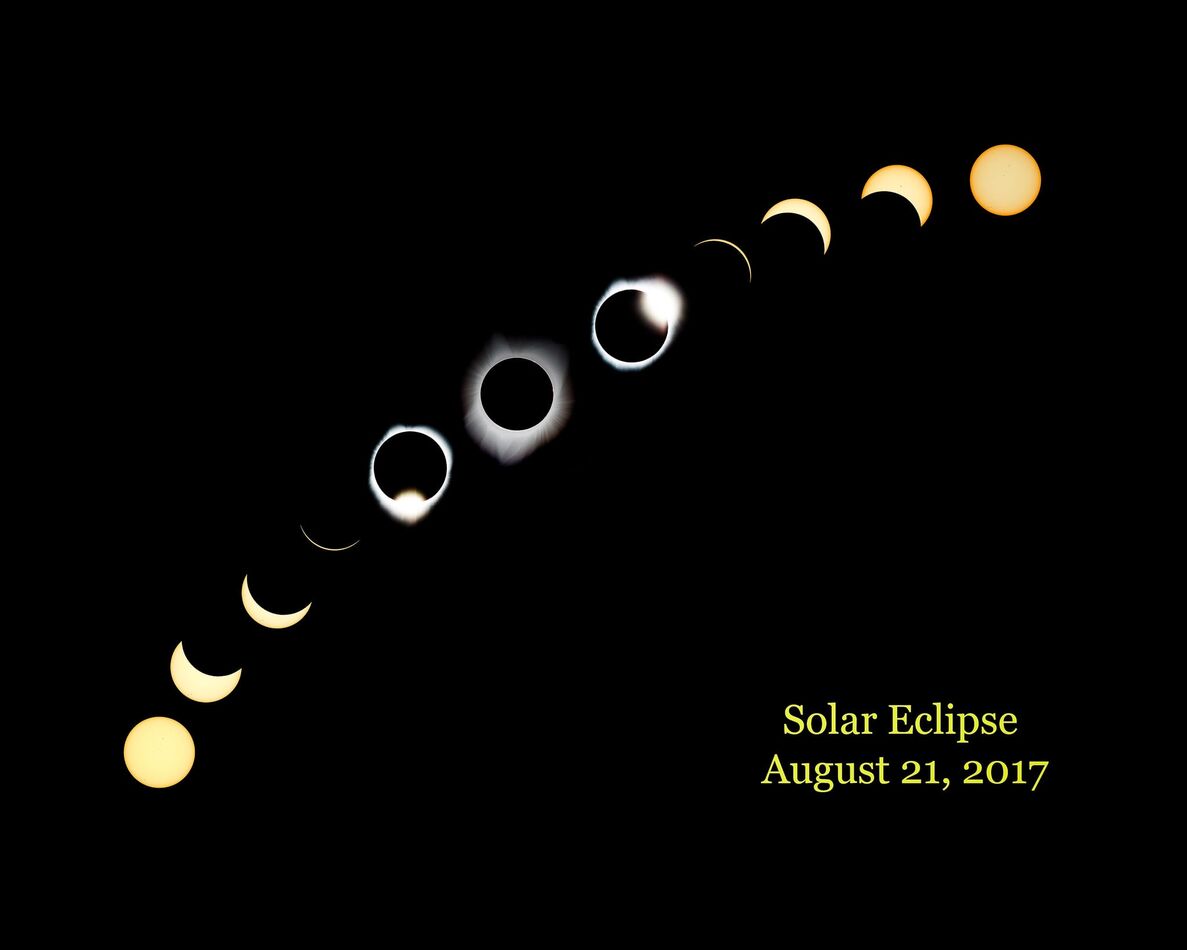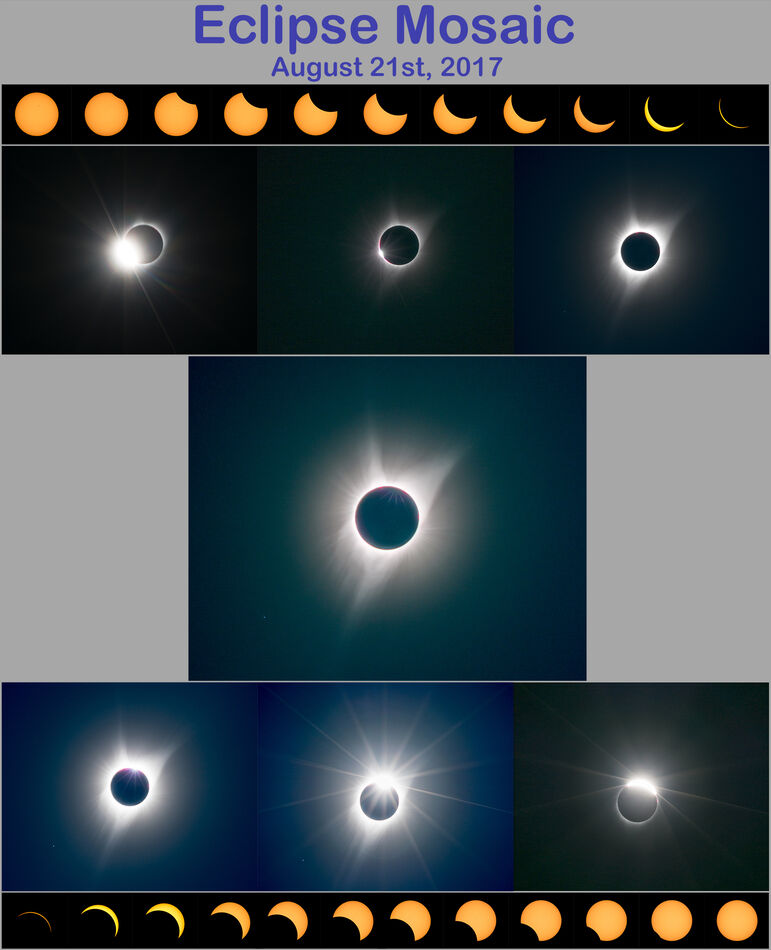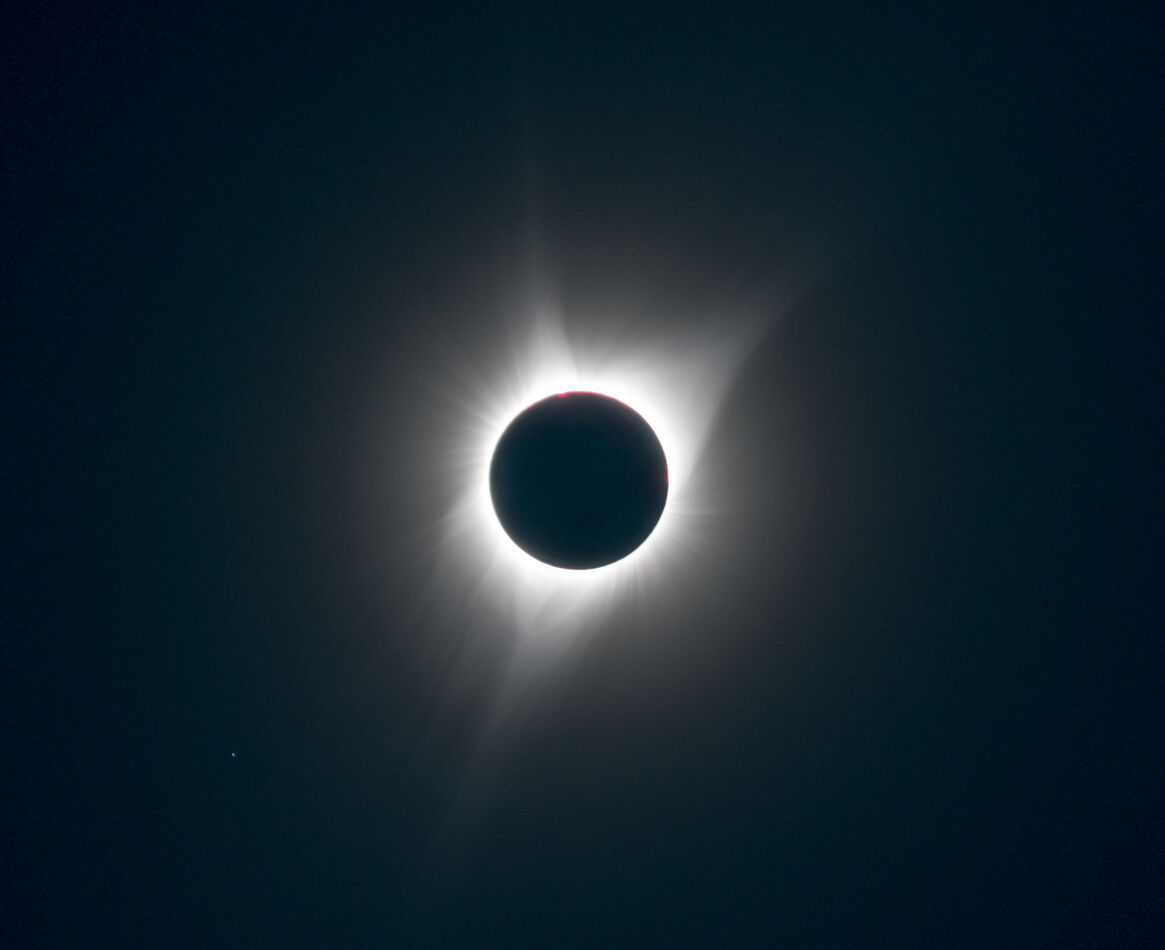Solar Eclipse Photography Options?
Sep 26, 2023 11:58:59 #
wkocken
Loc: McGregor, MN
For next year's solar eclipse, I’m trying to decide which optics to use. My choices are an Explore Scientific 102f7 carbon fiber apo (700mm fl). or a Canon 100-500L f4.5-7.1 with a 1.4x teleconverter (also 700mm, but at ~ f10). I’ll be using a Canon R6 on an Ioptron ZEQ25 GT equatorial mount. I want to capture filtered photos of the partial phases and unfiltered photos at totality. Baileys beads, prominences, corona etc.
Telescope Pros.
Better optics designed for astronomy??
Faster focal ratio.
Focus may not drift as it warms up. (It’s carbon fiber).
I can use it for visual astronomy on the nights before and after the eclipse.
Lens Pros.
Smaller, lighter (my mount struggles with the scope and camera combo).
Less to transport. (We will be making a long driving trip to get to Texas.)
Easier to focus. (I’m not that impressed with the scope's focuser.)
What are your nights or opinions?
(FYI. I posted this same question on cloudy Nights, for those that use both forums)
Telescope Pros.
Better optics designed for astronomy??
Faster focal ratio.
Focus may not drift as it warms up. (It’s carbon fiber).
I can use it for visual astronomy on the nights before and after the eclipse.
Lens Pros.
Smaller, lighter (my mount struggles with the scope and camera combo).
Less to transport. (We will be making a long driving trip to get to Texas.)
Easier to focus. (I’m not that impressed with the scope's focuser.)
What are your nights or opinions?
(FYI. I posted this same question on cloudy Nights, for those that use both forums)
Sep 26, 2023 13:00:47 #
Hi, Welcome to the Astrophotography Section of UHH!
There are many others here better versed than I in shooting old Sol.
I did not see Solar filters in your equipment. You MUST use solar filtering.
I got lucky with my earlier set up, an 80mm CF Refractor Triplet telescope.
I bought a ring mounted Solar film filter, then mounted it into a piece of 4" PVC.
That fit over my Telescope, and inside of my Tamron 150-600mm lens. A two-for-one.
The size of your filter depends on the lens you decide on. If really undecided, consider renting equipment compatible with your camera gear.
Practice, Practice, Practice. You can practice at home easily while you prepare. To work out any changes or bugs that crop up.
I have a new larger telescope this year I am really enjoying. I bought a mounted solar (glass) filter to fit it in hopes of catching what I might of the event. I'll be in my Backyard, again.
Best of luck! Enjoy your planning, and especially the event of the Solar Eclipse!
(PS: if you have the means, you might want to consider a dedicated Solar Telescope, and make a real hobby of it.)
Edit In: You might find a Hilio pod as invaluable as I do. Saves a lot of trial and error when getting on the sun.
Does your mount do solar tracking?
https://www.farlaboratories.com/dyna-hp1.html
I haven't tried my new telescope yet. But this is what I got with my Orion ED80 CF and Badder Solar Film filter.
https://youtu.be/BQNWcidTmhI?si=9NFl2qcN5poVT9jg
With a Barlows:
https://youtu.be/T2Nc2pFRjgk?si=BsCqPc2yKPIHWeTy
There are many others here better versed than I in shooting old Sol.
I did not see Solar filters in your equipment. You MUST use solar filtering.
I got lucky with my earlier set up, an 80mm CF Refractor Triplet telescope.
I bought a ring mounted Solar film filter, then mounted it into a piece of 4" PVC.
That fit over my Telescope, and inside of my Tamron 150-600mm lens. A two-for-one.
The size of your filter depends on the lens you decide on. If really undecided, consider renting equipment compatible with your camera gear.
Practice, Practice, Practice. You can practice at home easily while you prepare. To work out any changes or bugs that crop up.
I have a new larger telescope this year I am really enjoying. I bought a mounted solar (glass) filter to fit it in hopes of catching what I might of the event. I'll be in my Backyard, again.

Best of luck! Enjoy your planning, and especially the event of the Solar Eclipse!
(PS: if you have the means, you might want to consider a dedicated Solar Telescope, and make a real hobby of it.)
Edit In: You might find a Hilio pod as invaluable as I do. Saves a lot of trial and error when getting on the sun.
Does your mount do solar tracking?
https://www.farlaboratories.com/dyna-hp1.html
I haven't tried my new telescope yet. But this is what I got with my Orion ED80 CF and Badder Solar Film filter.
https://youtu.be/BQNWcidTmhI?si=9NFl2qcN5poVT9jg
With a Barlows:
https://youtu.be/T2Nc2pFRjgk?si=BsCqPc2yKPIHWeTy
Sep 26, 2023 13:44:25 #
wkocken
Loc: McGregor, MN
I have the mylar-type filters for both. I shot the 2017 eclipse in Wyoming with an 80mmF6 Carbon fiber APO and a crop sensor Canon 7D2, for an effective fl of 768mm. I was pretty happy with the results. Now I have a larger, heavier scope and a heavier camera, so my mount isn't as happy. Hence the idea to use the camera lens. I'm going to see if I can tune up the gears on the mount.
I've been doing visual astronomy for over 20 years, but I prefer night-time stuff. I have looked through dedicated solar scopes, and it's fun for a few minutes, but not worth the investment for me. And, except for wide field milky way stuff and the occasional eclipse, I don't do any astrophotography.
I've been doing visual astronomy for over 20 years, but I prefer night-time stuff. I have looked through dedicated solar scopes, and it's fun for a few minutes, but not worth the investment for me. And, except for wide field milky way stuff and the occasional eclipse, I don't do any astrophotography.
Sep 26, 2023 14:11:46 #
wkocken wrote:
I have the mylar-type filters for both. I shot the... (show quote)
Gotcha.
Mylar is my first filter.
I went with a glass for the new telescope.
I can't see the expense for a dedicated solar telescope either.
In fact, I'm not really interested in near objects. So I do Deep space and Nebula specific AP.
I blame Orion for it. Orion was the first real DSO I was able to observe with a 20-60x spotting scope. 10 years later, and a wheelbarrow full of cash later, here I am.
I was considering going to my old stomping grounds in Wyoming. But after all the hub-bub going on and doing Google Earth scouting, it isn't the place it was in the 1970's-1980's when I lived there.
I did find one of my friends who still lives where he was building a 4800 Sq Ft log home when I was there.
But, I didn't go. The wife and I did our observing from the back yard.
Sep 26, 2023 14:12:32 #
wkocken wrote:
For next year's solar eclipse, I’m trying to decid... (show quote)
I used a Sony A7R II and FE 24-240mm lens @ 240mm and a Baader Solar Film filter, tripod mounted for the last full eclipse. It worked reasonably well.
I'd use a similar configuration again; however, it would be my Sony A7R V and FE 200-600mm lens with the same Baader Solar film filter, tripod mounted. I'll be using this combo for the annular eclipse in October.
If you're going after prominences, you'll need a solar scope for the Ha response.
bwa
Sep 27, 2023 09:50:24 #
DougS
Loc: Central Arkansas
In 17 DAYS (!), there is an annular (partial) eclipse happening, that will be visible from Minnesota (and the rest of the U.S.).
Mark your calendar, set your cell phone alarm for this day/time! Will be excellent practice for the 'BIG EVENT'!
https://solarsystem.nasa.gov/eclipses/2023/oct-14-annular/where-when/
Mark your calendar, set your cell phone alarm for this day/time! Will be excellent practice for the 'BIG EVENT'!
https://solarsystem.nasa.gov/eclipses/2023/oct-14-annular/where-when/
Sep 27, 2023 10:25:32 #
DougS wrote:
In 17 DAYS (!), there is an annular (partial) eclipse happening, that will be visible from Minnesota (and the rest of the U.S.).
Mark your calendar, set your cell phone alarm for this day/time! Will be excellent practice for the 'BIG EVENT'!
https://solarsystem.nasa.gov/eclipses/2023/oct-14-annular/where-when/
Mark your calendar, set your cell phone alarm for this day/time! Will be excellent practice for the 'BIG EVENT'!
https://solarsystem.nasa.gov/eclipses/2023/oct-14-annular/where-when/
Hey that's great Doug!
Thanks for posting that.
I'll be in the 70-71% area. (South/West of the path)
I'd better get to practicing!
Sep 27, 2023 14:45:42 #
DougS
Loc: Central Arkansas
SonnyE wrote:
Hey that's great Doug!
Thanks for posting that.
I'll be in the 70-71% area. (South/West of the path)
I'd better get to practicing!
Thanks for posting that.
I'll be in the 70-71% area. (South/West of the path)
I'd better get to practicing!
I need to go practice some, too! Particularly since I am lucky enough to be in the 'Big Event' (2024) line of totality! I will have 2 minutes and 32 seconds of that! Just a few miles west of me, they will get 4 minutes!
Sep 27, 2023 15:16:04 #
DougS wrote:
I need to go practice some, too! Particularly since I am lucky enough to be in the 'Big Event' (2024) line of totality! I will have 2 minutes and 32 seconds of that! Just a few miles west of me, they will get 4 minutes!
Lucky you!
I'm fiddling with mine today.
It is easy because I was doing AP last night.
After my flats this morning, I put on my solar filter and been fiddling all day.
Been setting up fire capture for my Solar program. (Well, setting up is rather broad. I'm fumble-bumbling with it.)

Sep 27, 2023 21:31:48 #
wkocken
Loc: McGregor, MN
This my composite from 2017. The effective focal length was 768mm. For 2024 I’m trying to decide between a 714mm APO telescope or a Canon 100-500L lens with a 1.4x teleconverter.
The scope is bigger and stresses my equatorial mount.
The scope is bigger and stresses my equatorial mount.

Sep 27, 2023 22:02:52 #
Nice composition.
If it were me, and not so hot on AP, just the Sun, I would definately go with the camera lens.
I'm a two-fer kind of shopper. If i can see a two or more use for a tool, I'm sold on it.
The lens fits that criteria.
If you were going to continue into doing AP, I'd say the telescope.
Personally, I'm into a dedicated camera with a telescope. Not a DSLR with a telescope.
I have done both. But a specialized camera, with a telescope works better in my opinion.
That said, when chasing comets, i use my DSLR with my Tameron 150-600mm lens.
I think you are leaning towards the lens. I'd bet you would be happier, and it is what you really want.
Consider yourself shoved.

If it were me, and not so hot on AP, just the Sun, I would definately go with the camera lens.
I'm a two-fer kind of shopper. If i can see a two or more use for a tool, I'm sold on it.
The lens fits that criteria.
If you were going to continue into doing AP, I'd say the telescope.
Personally, I'm into a dedicated camera with a telescope. Not a DSLR with a telescope.
I have done both. But a specialized camera, with a telescope works better in my opinion.
That said, when chasing comets, i use my DSLR with my Tameron 150-600mm lens.
I think you are leaning towards the lens. I'd bet you would be happier, and it is what you really want.
Consider yourself shoved.

Sep 27, 2023 22:03:28 #
Sep 30, 2023 14:36:46 #
Ballard
Loc: Grass Valley, California
wkocken wrote:
For next year's solar eclipse, I’m trying to decid... (show quote)
You are correct about the focuser on the Scientific explorer, I replaced the one on my Scientific explorer with a feature touch focuser and now it works great. The f ratio shouldn't matter much for the sun as it is plenty bright so the camera lens should work well. In either case as SonnyE mentioned you will need a solar filter until the totality starts at that point remove the filter and RECHECK the focus for images during totality as the filter will change the focus slightly.
Sep 30, 2023 20:09:21 #
wkocken
Loc: McGregor, MN
A feather touch focuser would be great, but they’re very pricey. I simply don’t use that scope enough to justify it.
Sep 30, 2023 20:34:26 #
Ballard
Loc: Grass Valley, California
wkocken wrote:
A feather touch focuser would be great, but they’re very pricey. I simply don’t use that scope enough to justify it.
They are pricey but I wanted to be able to take deep sky images and the focuser it came with just would remain stable for any long exposures with the weight of a camera on it. For the eclipse I plan to use a 500mm lens so I can capture the whole corona and take 4K video and then stack parts of the video to get still shots. I will also have my 952mm refractor for the closeup shots and use my older DSLR to also take video but it will only be HD. Hopefully it won't be cloudy.
Here are some shots from the 2017 eclipse using my older DSLR.
https://www.uglyhedgehog.com/t-615123-1.html
If you want to reply, then register here. Registration is free and your account is created instantly, so you can post right away.

